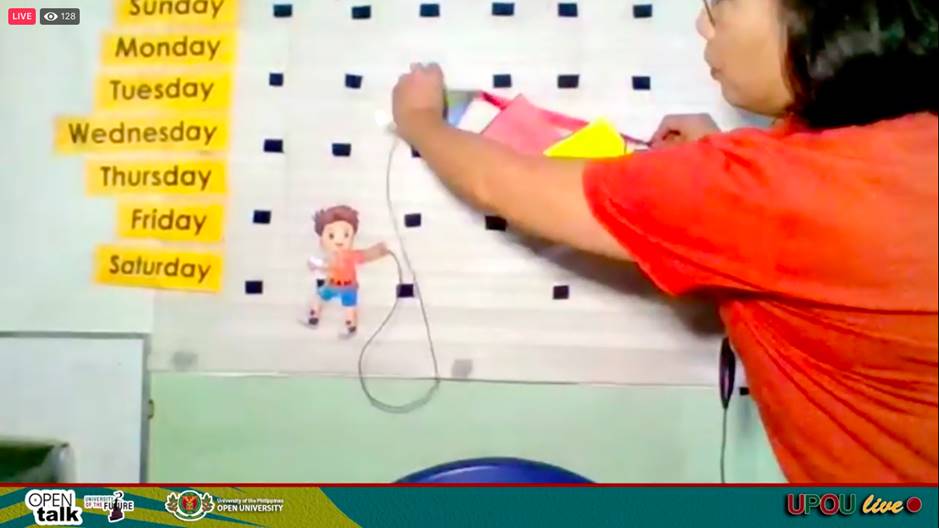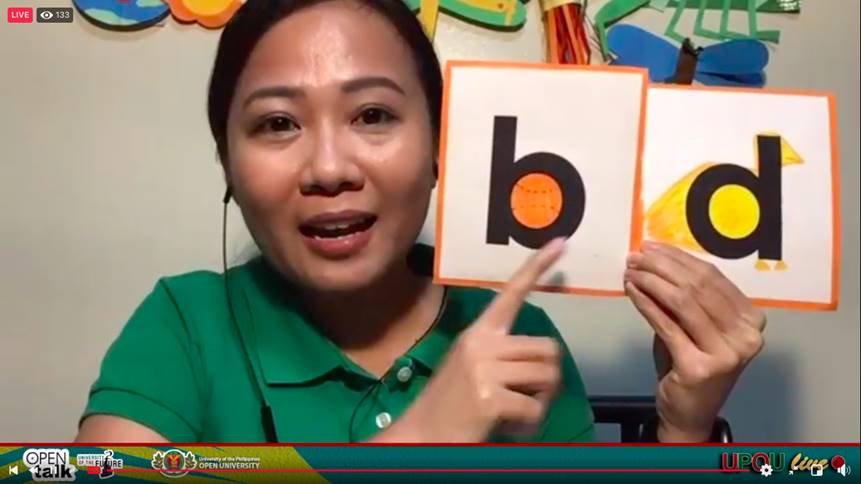The University of the Philippines Open University (UPOU) streamed the 4th episode of Open Talk which focused on teaching reading in a remote learning situation on 21 April 2021.
Two resource persons were featured for this episode — Ms. Michelle Agas, a Teacher, Storyteller, and Children’s Show Host; and Ms. Julie Weygan-Aparato, Program Lead and Teacher at Interactive Children’s Literacy Program. The program was moderated by Assoc. Prof. Portia Padilla of the UP Diliman College of Education, and Ms. Charlene Mina of the UPOU Office of Ugnayan ng Pahinungod (OUP) served as the program’s host.
![[Left to Right] Program moderated by Assoc. Prof. Portia Padilla of UP Diliman College of Education, Ms. Julie Weygan-Aparato, Program Lead and Teacher at Interactive Children’s Literacy Program, and Ms. Michelle Agas, who is a Teacher, Storyteller, and Children’s Show Host. [Left to Right] Program moderated by Assoc. Prof. Portia Padilla of UP Diliman College of Education, Ms. Julie Weygan-Aparato, Program Lead and Teacher at Interactive Children's Literacy Program, and Ms. Michelle Agas, who is a Teacher, Storyteller, and Children's Show Host.](https://www.upou.edu.ph/wp-content/uploads/2021/05/Open-Talk-4_1.jpg)
As an introduction, Assoc. Prof. Padilla defined what reading and comprehension are. She mentioned the literacies to be considered, such as the early literacy skill in knowing the letters of the alphabet and phonological awareness, which is the skill in knowing the sound structures of language. There is also the importance of blending the sound of the word, which includes the skill of matching the letter to its sound/s and vise versa.
This introduction paved the way to the question of how can teachers (and parents) teach reading in remote learning situations. The two resource speakers energetically shared insightful techniques and tips.

Teacher Julie shared her experience with their barangay-based reading project. It’s a free project that focuses on giving opportunity to the urban poor children (both enrolled in public school and students that have dropped out) in learning how to read. When asked how it started and became successful, she shared that although there were quite a number of challenges considering that the majority of the children depended on free (mobile) data – where only about 1 to 2 households have WIFI access – a big part of the success is the community effort. This means that there was crowd-sourcing – when help was needed and the community was willing to help one another. As for the platform used, Facebook messenger was considered the best option since this can be accessed on free data. As for the techniques that Teacher Julie uses, she shared that storytelling is one of the techniques that really helped. She mentioned using stories instead of going straight to the lesson. This increases the retention and relatability of students, especially with the phonological awareness.

Aside from storytelling, Teacher Michelle added another technique which is the use of the special alphabet cards. Alphabet cards help the students learn through visual and auditory senses. Since she teaches primarily in the English language, the added value of these alphabet cards is that it helps in teaching how to write the letters as well. An example she gave was the letters b and d. The way she drew it was she had a “ball” in front of the letter b. It serves as a guide when a student writes the letter “B,” it is a visual guide that the ball is placed after the stem. As for the letter d, duck is the example. The curve is before the stem – just like the back side of a duck. Another technique that Teacher Julie shared is by asking the students to touch their mouth and their throat when making the sounds of the alphabet letters or words and to take note of the different vibration it makes. She believes that teaching, especially now that everything’s online, has to be multi-sensorial.
Asst. Prof. Padilla expressed her gratitude to the two resource persons for sharing their techniques in helping children how to read. She promised a Part 2 on this topic of teaching reading in remote learning situations.
This episode of OPEN Talk was organized by the UPOU Multimedia Center in coordination with the UPOU Office of Ugnayan ng Pahinungod. OPEN Talk is a one-hour public service program to be broadcasted real-time over the UPOU Networks website and UPOU Networks Facebook page.
What do you think? Do you have any teaching techniques that you want to share with us as well? Check out the Open Talk Episode 4 replay via the links below:
UPOU Networks networks.upou.edu.ph/opentalk
UPOU Networks – Multimedia Center Facebook Page https://fb.watch/50QZBNJXWw/








